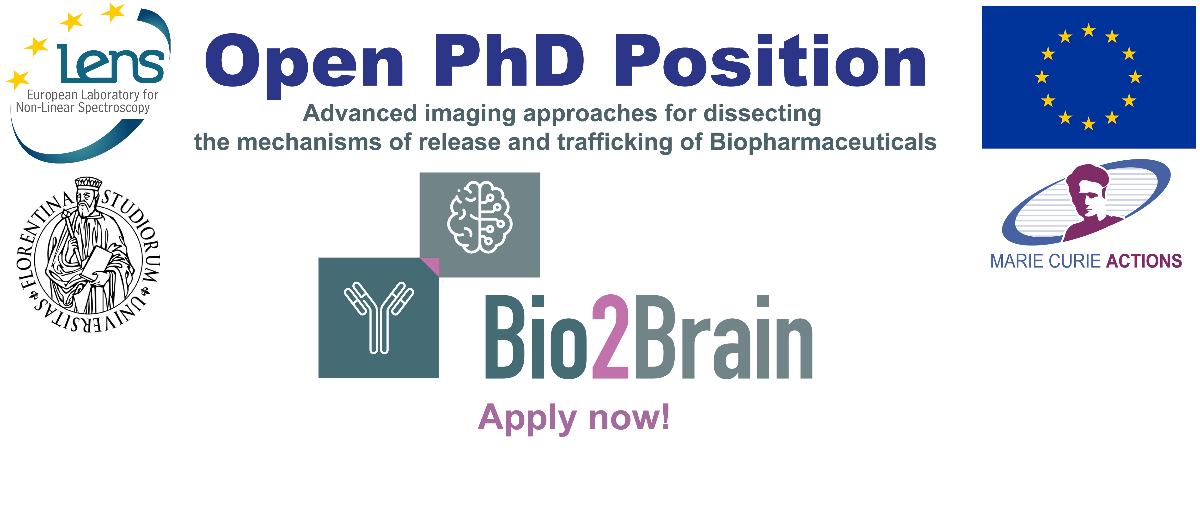
MSCA-ETNs are joint research and training projects funded by the European Union. Funding is provided for PhD students from both inside and outside Europe to carry out individual project work in a European country other than their own. Disorders of the central nervous system, including multiple sclerosis as well as Alzheimer’s and Parkinson’s diseases, affect around 165 million people in Europe. These disorders are often associated with severe suffering of the patients and their families, as well as an enormous burden on the social systems. The Bio2Brain trans-European research network aims to promote efficient drug administration to the CNS.
At LENS, we are offering the following PhD position:
Subproject title:
Advanced imaging approaches for dissecting the mechanisms of release and trafficking of Biopharmaceuticals
Starting date: 01.11.2021
Job description
The advertised subproject will be carried out by a PhD student (“Early-stage Researcher”) at the European Laboratory for Non-Linear Spectroscopy (Lens) over a period of 36 months. The recruited researcher will work in the Biophotonics laboratory of LENS. The ESR will be registered for the PhD programme at the University of Florence.
The overall goal of this subproject is to analyse the transport of IgG and its dependency on Fc-interacting molecules in vitro and ex vivo.
The specific goals are:
- Nano to micro scale study of antibodies release from nano/micro particles in hydrogel by means of single molecule imaging and fluoresce spectroscopy
- Imaging trafficking and diffusion of released antibodies in mixed primary cultures of olfactory epithelial cells and neurons by means of single molecule tracking experiments.
- Meso to macro scale monitoring of diffusion of antibodies in clarified mouse brains by means of confocal light sheet microscopy.
The main working tasks of the advertised subproject are:
- Characterization of antibodies release kinetics from nano/micro particles and diffusion rates in hydrogels in vitro
- Determination of type of motion of selected antibodies during trafficking in primary cultures of olfactory epithelial cells and neurons to elucidate if antibody transport is extracellular (Brownian diffusion expected) or intracellular (directed type of motion due to active transport)
- Realization of a brain wide map illustrating the specific tropism of selected antibodies.
Secondments are planned as follows:
- Biberach University of Applied Sciences, Germany, for one-month training in dissection/cultivation of mouse nasal cavity cells (epithelial, olfactory, lymphoid) and basic training in antibody engineering.
- University of Bern, Switzerland, for one month for training in imaging of trafficking and diffusion of antibodies in tissue to extend findings of the brain wide map in the pathophysiological context.
- Vector Pharma GmbH, Germany, for one week, to learn methods for industrial applications of therapeutics and pharmaceutical analysis.
- University of Cambridge, UK, for one month to learn computational design and characterization of small molecules and antibody therapeutics.
This subproject is fully funded by the Marie Skłodowska-Curie European Training Network „Bio2Brain“ (H2020-MSCA-ITN-2020). The monthly gross salary consists of a living allowance, mobility allowance and family allowance (if applicable). This is € 45,262,80 per annum which includes the single person’s mobility allowance, or €51,262.80 per annum, which includes the married person’s/dependents mobility allowance.
For more information on MSCA-ITN, please see: https://ec.europa.eu/research/mariecurieactions/.
The recruited researcher will have the opportunity to work as part of an international, interdisciplinary team of 13 PhD students, based at universities and industrial firms throughout Europe.
The successful candidate will attend yearly summer schools as well as international meetings and will receive training on transferable skills. She/he is expected to finish the project with a PhD thesis and to disseminate the results through patents (if applicable), publications in peer-reviewed journals and presentations at international conferences.
Requirements
Qualifications / experience
- Early-stage researcher: a researcher without a PhD, who is in the first four years (full-time equivalent research experience) of her/his research career, measured from the date when she/he obtained the degree, which would formally entitle her/him to embark on a doctorate.
- Graduation in the field of Biology, Biotechnology, Chemistry or related fields – M.Sc. preferred. [mc1]
- Experience in at least one of the following areas: cell biology, biophysics, molecular biology, neuroscience, microscopy, nanoscience
- Basic knowledge of cell biology.
- Practical experience with image analysis is a plus.
- Basic knowledge of data analysis and Microsoft Office.
- Well-structured and autonomous working style, flexible and co-operative, good organizational and communication skills, willing to travel and go on secondments.
- Fluency in written and spoken English is a must, Italian is a plus.
Mobility
The applicant must not have resided or carried out her/his main activity (work, studies etc.) in Italy for more than 12 months in the past three years. Compulsory national service, short stays such as holidays, and time spent as part of a procedure for obtaining refugee status under the Geneva Convention are not taken into account.
How to apply
Interested candidates are strongly advised, prior to applying, to read carefully the job description and to contact Martino Calamai at calamai@lens.unifi.it in case of any questions or doubts.
To apply, please send an email with the following documents to segreteria@lens.unifi.it : Your complete CV, a half-page summary of master thesis, a letter of motivation (up to 1 page) which states your research experience and interests, and names and contact information of at least two academic referees who could write a letter of recommendation.
For further information about Bio2Brain, please see: https://bio2brain.eu/
Assessment of applications starts 15 March 2021,
Deadline for the application is April 11, 2021.
Interviews are planned for April/ May 2021.
